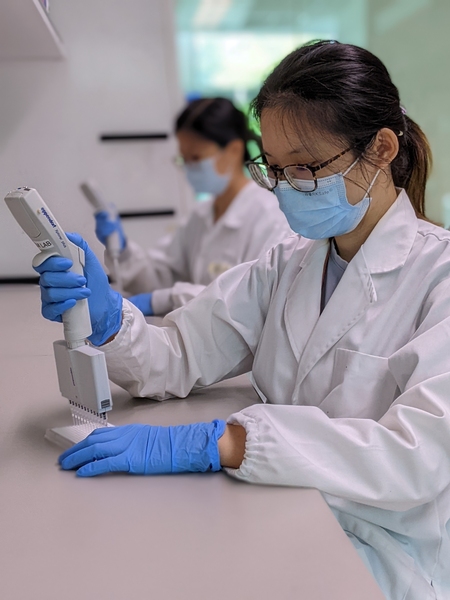A joint study by the Singapore General Hospital (SGH) and Singapore-MIT Alliance for Research and Technology (SMART), MIT’s research enterprise in Singapore, may have found the reason some patients experience diarrhea after taking the antibiotic amoxicillin-clavulanate, commonly known as Augmentin. It is a widely prescribed antibiotic used to treat many infections, including pneumonia and urinary tract infections.
The team of researchers found that the level of gut Ruminococcaceae, a family of bacteria that plays an important role in maintaining an individual’s gut health, strongly impacts diarrheal outcomes following antibiotic treatment.
“The problem is very real for patients who are unable to take amoxicillin-clavulanate because it gives them diarrhea, even though it is an effective and affordable antibiotic for their infection. Knowing why may help us identify those at risk of antibiotic-associated diarrhea, and devise treatment strategies in the future to minimize or avoid such adverse effects,” says Shirin Kalimuddin, consultant, SGH Department of Infectious Diseases, the principal investigator of the study.
A total of 30 healthy volunteers were recruited for the study. They each received a three-day oral course of amoxicillin-clavulanate. Their stool samples were collected on stipulated days over a period of four weeks and analyzed using gene sequencing to look for changes in the gut microbiome during the study period.
Results showed that Ruminococcaceae levels in the stools of study volunteers who developed diarrhea were significantly lower when compared to those who did not, both before and during treatment with amoxicillin-clavulanate. This suggests that individuals may, depending on their gut composition, be predisposed to antibiotic-associated diarrhea. The team further devised a simple polymerase chain reaction test based on levels of Faecalibacterium prausnitzii, a species within the Ruminococcaceae family, that could potentially be used in clinical settings to quickly determine an individual’s risk of developing diarrhea with amoxicillin-clavulanate treatment.
“People respond differently to medication. Understanding this response and the ability to predict those at risk will help guide the development of point-of-care diagnostics,” says Eric J. Alm, professor of biological engineering at MIT, principal investigator at SMART Antimicrobial Resistance (AMR) interdisciplinary research group, and co-corresponding author of the study.
“While a lot of attention has been paid to how DNA influences a person’s response to medication, the impact of the gut microbiome on the human drug response has not been widely researched. Our findings provide evidence that an individual’s gut microbial composition can influence the risk of developing antibiotics-associated diarrhea. Tested against amoxicillin-clavulanate, the study provides a framework to identify other potential causes of antibiotic-associated diarrhea in relation to other classes of antibiotics,” adds Alm.
Globally, one in three patients prescribed amoxicillin-clavulanate will develop diarrhea. In some cases, their diarrhea may be so severe that doctors have to stop the antibiotic prematurely, resulting in inadequate treatment of the infection, or the need to switch to another antibiotic that may be more costly or can only be given intravenously. The diarrhea could also prolong patients’ hospital stays, leading to an increased risk of other infections as a result.
Building upon what is now known, the team now hopes to conduct a clinical trial to see if certain species of bacteria within the Ruminococcaceae family could be used as a probiotic to prevent diarrhea in patients receiving antibiotics.
The study findings were published in the peer-reviewed scientific journal iScience in January.
Singapore General Hospital, a member of Singapore Health Services, is the public sector's flagship hospital. Established in 1821, SGH is Singapore's largest acute tertiary hospital with 1,700 beds and a national referral center offering a comprehensive range of more than 40 clinical specialties on its campus. Every year, about 1 million Singaporeans benefit from medical care delivered by its 800 specialists. As an academic health-care institution and the bedrock of medical education, SGH plays a key role in nurturing doctors, nurses, and allied health professionals, and is committed to innovative translational and clinical research in her continual strive to provide the best care and outcomes to her patients.
SMART was established by MIT in partnership with the National Research Foundation of Singapore (NRF) in 2007. SMART is the first entity in the Campus for Research Excellence and Technological Enterprise (CREATE) developed by NRF. SMART serves as an intellectual and innovation hub for research interactions between MIT and Singapore, undertaking cutting-edge research projects in areas of interest to both Singapore and MIT. SMART currently comprises an Innovation Center and five interdisciplinary research groups (IRGs): AMR, Critical Analytics for Manufacturing Personalized-Medicine, Disruptive & Sustainable Technologies for Agricultural Precision, Future Urban Mobility, and Low Energy Electronic Systems.
SMART research is funded by the NRF under the CREATE program.
The AMR IRG is a translational research and entrepreneurship program that tackles the growing threat of antimicrobial resistance. By leveraging talent and convergent technologies across Singapore and MIT, they tackle AMR head-on by developing multiple innovative and disruptive approaches to identify, respond to, and treat drug-resistant microbial infections. Through strong scientific and clinical collaborations, AMR provides transformative, holistic solutions for Singapore and the world.


![“The biology [around gut bacteria’s influence on health] is fairly complex, and we’re still in the early days of unravelling it, but there have been a number of clinical studies that have reported benefits to restoring gut health, and that’s our north star: the clinical data,” Finch co-founder and Chief Executive Officer Mark Smith PhD ’14 says.](/sites/default/files/styles/news_article__archive/public/images/202007/MIT-Finch-01.jpg?itok=nMuVS-Q9)






